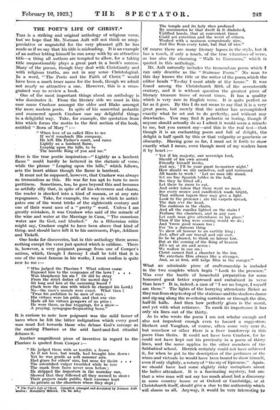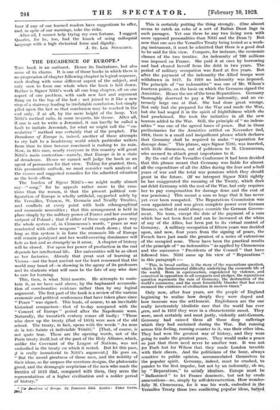THE POET'S LIFE OF CHRIST.*
Tins is a striking and original anthology of religious verse, but we hope that Mr. Norman Ault will not think us unap- preciative or ungrateful for the very pleasant gift he has `made us if we say that his title is misleading. It is an example of an author letting himself be run away with by an attractive title—a thing all authors are tempted to allow, for a taking title unquestionably plays a great part in a book's success. Many of the poems, though they deal with Christianity and with religious truths, are not in any sense Christological. In a word, " The Poets and the Faith of Christ " would have been a much truer name for the book, though we admit not nearly so attractive a one. However, this is a cross- grained way to review a book.
One of the most important things about an anthology is who dominates it. From the literary side we must in this case name Crashaw amongst the older and Blake amongst the more modern poets. In spite of his somewhat pedantic and mannered speech Crashaw can say delightful things in a delightful way. Take, for example, the quotation from him which forms the motto to the first section of the book, entitled " Born of Mary " :—
" When love of us called Him to see If we'd vouchsafe His company, Ile left His Father's court, and came Lightly as a lambent flame,
Leaping upon the hills, to be
The humble King of you and me."
Here is the true poetic inspiration—" Lightly as a lambent flame " could hardly be bettered in the rhetoric of verse, while the phrase " Leaping upon the hills," which follows, sets the heart ablaze though the flame is lambent.
It must not be supposed, however, that Crashaw was always so tremendous as this. He was far too apt to turn to mere prettiness. Sometimes, too, he goes beyond this and becomes so artfully silly that, in spite of all his cleverness and charm, the reader is shocked into a kind of nausea, or at any rate repugnance. Take, for example, the way in which he antici- pates one of the worst tricks of the eighteenth century and one of their worst uses of a " pretty " word. Unless I am greatly mistaken, it was Crashaw who said of the miracle of the wine and water at the Marriage in Cana, " The conscious water saw its God, and blushed." As a Hibernian critic might say, Crashaw ought to have been above that kind of thing. and should have left it to his successors, Pope, Addison and Tickell.
One looks for discoveries, but in this anthology there seems nothing except the verse just quoted which is sublime. There is, however, a very poignant passage from one of Cowper's satires, which, though I daresay I shall be told that it is one of the most famous in his works, I must confess is quite new to me
" Who judged the Pharisee ? What odious cause
Exposed hum to the vengeance of the laws ? . • Was blasphemy his sin ? Or did he stray From the strict duties of the sacred day ? Sit long and late at the carousing board ?
(Such were the sins with which he charged his Lord.) No—the man's morals were exact. What then ?.
'Twas his ambition to be seen of men ; His virtues were his pride, and that one vice Made all his virtues gewgaws of no price ;
He wore them, as fine trappings, for a show—
A praying, synagogue-frequenting beau."
It is curious to note how poignant was the mild tamer of hares when he felt the bitter indignation which every good man must feel towards those who debase God's coinage as the canting Pharisee or the and hard-and-fast ritualist debases it.
Another magnificent piece of invective in regard to the Pharisee is quoted from Cowper :—
" He judged them with as terrible a frown
As if not love, but wrath, had brought him down : Yet he was gentle as soft summer airs,
Had grace for others' sins, but none for theirs • 4 The astonished vulgar trembled while he tore The mask from faces never seen before ; He stripped the impostors in the noonday sun, Showed that they followed all they seemed to shun : Their prayers made public, their excesses kept As private as the chambers where they slept ; • • The Pod's 14. of Christ. Compiled, arranged and decorated by Norman Ault louden : Humphrey Milford. 17a. ed. net.1 The temple and its holy rites profaned By mummeries he that dwelt in it disdained, Uplifted hands, that at convenient times Could act extortion and the worst of crimes, Washed with a neatness scrupulously nice, And free from every taint, but that of vice."
Of course there are many literary lapses in the style, but it has a touch, if only a touch, of the true vitamines of verse, as has also the charming Walk to Ennaeus," which is quoted in this anthology.
Mr. Ault naturally includes the tremendous poem which I can only describe as the " Staircase Poem." No man to this day knows the title or the writer of the poemovhich the editor heads "To-day I must abide at thy house." It was found among the Christchurch MSS. of the seventeenth century, and it is without question the greatest piece of literary treasure trove of recent times. It has a quality which is very rare in English verse. It is quite perfect so far as it goes. By this I do not mean to say that it is a very great poem, but merely that the author has accomplished exactly what he set out to do perfectly, and without any drawbacks. You may find it pedantic or boring, though if anyone should actually do so I admit it would seem a miracle to me, but you cannot say—and this is the real test—that though it is an enchanting poem and full of delight, the delight is half spoilt by this or that vulgarity or gaucherie or obscurity. Having gone so far, I must set it forth to show exactly what I mean, even though most of my readers have it by heart :— " Yet if his majesty, our sovereign lord, Should of his own accord Friendly himself invite,
And say, ` I'll be your guest to-morrow night,'
How should we stir ourselves, call and command All bands to work ! Let no man idle stand.
Set me tine Spanish tables in the hall, See they be fitted all ; Let there be room to eat, And order taken that there want no meat.
See every sconce and candlestick made bright, That without tapers they may give a light.
Look to the presence : are the carpets spread, The dais o'er the head, The cushions in the chairs, And all the candles lighted on the stairs ?
Perfume the chambers, and in any case Let each man give attendance in his place.' Thus if the king were coming would we do ; And 'twere good reason too : For 'tis a duteous thing
To show all honour to an earthly king ;
And, after all our travail and our cost, So he be pleased, to think no labour lost, But at the coming of the King of heaven All's set at six and seven : We wallow in our sin : Christ cannot find a chamber in the inn.
We entertain Him always like a stranger, And, as at first, still lodge Him in the manger."
What an admirable piece of craftsmanship is included in the two couplets which begin " Look to the presence." Was ever the bustle of household preparation for some honoured guest better expressed and embalmed in verse than here ? it is, indeed, a case of " I see no longer, I myself am there." The lights of the hurrying attendants flicker as they run from step to step of the staircase and the shadows dance and zig-zag along the re-echoing corridors or through the dim, half-lit halls. And then how perfectly given is the moral, and yet with what reticence. To mark its importance it has only six lines out of the thirty.
As to who wrote the poem I am not scholar enough and also not impudent enough even to hazard a suggestion. Herbert and Vaughan, of course, often come very near it, but somehow or other there is a freer handsweep in this poem than theirs. It could not have been Crashaw, for he could not have kept out his preciosity in a poem of thirty lines, and the same applies to the other members of the Sabbatical school. Herrick certainly could not have achieved it, for when he got to the description of the perfumes or the wines and victuals he would have been bound to show himself, even if only slightly, a votary of " the sty of Epicurus." Again, we should have had some slightly risky metaphors about the ladies attendant. It is a fascinating mystery, but one that a wise man will not say too much about lest a discovery in some country house or at Oxford or Cambridge, or at Christchurch itself, should give a clue to the authorship which will shatne us all. Anyway, it would be very interesting to
hear if any of our learned readers have suggestions to offer, and, in spite of our warnings, take the risks.
After all, I cannot help trying my own fortune. I suggest Quarles, for he, too, had the knack of using colloquial language with a high rhetorical force and dignity.
J. ST. Lou STRACHEY.



































































 Previous page
Previous page